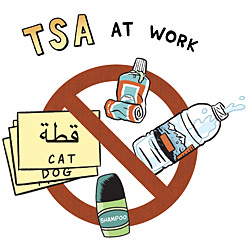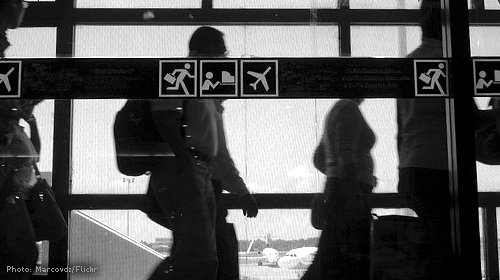ACLU Sues Over Unconstitutional Airport Detention And Interrogation Of College Student Carrying Arabic Flashcards

Incident At Philadelphia Airport Highlights Misdirected Security Efforts, Says ACLU
FOR IMMEDIATE RELEASE
CONTACT: (212) 549-2666; media@aclu.org
PHILADELPHIA – The American Civil Liberties Union and the ACLU of Pennsylvania today filed a lawsuit on behalf of Pomona College student Nicholas George, who was abusively interrogated, handcuffed and detained for nearly five hours at the Philadelphia International Airport because of a set of English-Arabic flashcards he was carrying in connection with his college language studies.
"Arresting and restraining passengers who pose no threat to flight safety and are not breaking any law not only violates people's rights, but it won't make us any safer. It may actually make us less safe, by diverting vital resources and attention away from true security threats," said Ben Wizner, staff attorney with the ACLU National Security Project. "Nick George was handcuffed, locked in a cell for hours and questioned about 9/11 simply because he has chosen to study Arabic, a language that is spoken by hundreds of millions of people around the world. This sort of harassment of innocent travelers is a waste of time and a violation of the Constitution."
George was on his way back to school in California in August 2009 when he was prompted by Transportation Security Authority (TSA) agents to empty his pockets at an airport security screening point. After producing a set of English-Arabic flashcards, which each had an English word on one side and the corresponding Arabic word on the other, George was detained by the TSA agents in the screening area for 30 minutes. A TSA supervisor then arrived and aggressively questioned George, asking him questions such as how he felt about 9/11, whether he knew "who did 9/11" and whether he knew what language Osama bin Laden spoke.
A Philadelphia police officer then arrived, handcuffed George and led him through a terminal to the airport police station where he was left in a locked cell for two hours in the handcuffs, and for two more hours with the handcuffs removed. George was then interrogated for half an hour by two FBI agents. He was never informed of why he was handcuffed, detained or arrested, and he was not informed of his rights. By the time he was released, George had long since missed his flight and was told by airline officials that he would have to wait until the next day to travel.
"As someone who travels by plane, I want TSA agents to do their job to keep flights safe. But I don't understand how locking me up and harassing me just because I was carrying the flashcards made anybody safer," said George. "No one should be treated like a criminal for simply learning one of the most widely-spoken languages in the world."
The lawsuit charges that the TSA officials, the Philadelphia police and the FBI violated George's Fourth Amendment right to be free from unreasonable seizure and his First Amendment right to free speech. The ACLU filed the lawsuit on George's behalf in the U.S. District Court for the Eastern District of Pennsylvania, against the three TSA officers, two FBI agents and two members of the Philadelphia Police Department who were involved in his detainment and interrogation.
"It should not have taken four hours to determine that Nick George was not a security threat. In fact, it should not have taken four minutes," said Mary Catherine Roper, staff attorney with the ACLU of Pennsylvania. "He was handcuffed and held behind bars for no reason. These agents need to be held accountable for that."
Lawyers on the case are Wizner and Jonathan Manes of the ACLU, Roper of the ACLU of Pennsylvania and David Rudovsky of the law firm Kairys, Rudovsky, Messing & Feinberg, LLP.
The ACLU's complaint is available online at: www.aclu.org/national-security/george-v-tsa-complaint-damages
A video featuring Nick George and Ben Wizner talking about the case is at:


